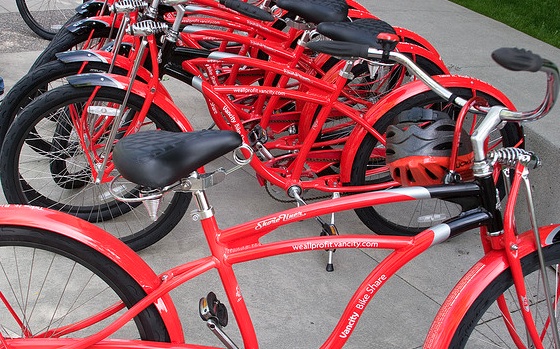 New algorithms make bike sharing more efficient.
New algorithms make bike sharing more efficient.
The environmentally-friendly concept of bike-sharing is taking over European cities like Paris, and Tel Aviv is about to get its own too –– although that’s been in the works for several years. Bike sharing, if you haven’t experienced it allows a subscriber to “borrow” a bike from one of hundreds of locations in the city, use it, and return it to another location at the end of the journey.
It’s good for commuters and for running short errands. The idea is gaining speed and subscribers at the 400 locations around the world where it has been implemented, there have been growing pains — partly because the projects have been so successful. About seven percent of the time, users aren’t able to return a bike because the station at their journey’s destination is full. And sometimes stations experience bike shortages, causing frustration with the system. But Tel Aviv University researchers have a solution to turn bike sharing into a science.
Dr. Tal Raviv and Prof. Michal Tzur are developing a mathematical model to lead to a software solution: “There is no system for more scientifically managing the availability of bikes, creating dissatisfaction among users in popular parts of the city.”
As an environmentalist, Raviv wants to see more cities adopt the bike-sharing system. In Paris alone, there are 1,700 pick-up and drop-off stations. To help coordinating availability of bikes and drop off stations, their students have created a mathematical model to predict which bike stations should be refilled or emptied — and when that needs to happen.
In small towns with 100 stations, mere manpower can suffice, they say. But anything more and it’s really just a guessing game. A computer program will be more effective: “Our research involves devising methods and algorithms to solve the routing and scheduling problems of the trucks that move fleets, as well as other operational and design challenges within this system,” says Raviv.
What are the benefits of bike-sharing? Raviv says they are easy to point out:
cut down traffic congestion
alleviate parking shortages
reduce air pollution and health effects such as asthma and bronchitis
promote fitness
enable good complementary public transportation by allowing commuters to ride from and to train or bus stations
Because of the low cost of implementing bike-sharing programs, cities can benefit without significant financial outlay. And in some cities today, bicycles are also the fastest form of transport during rush hour.
The city of Tel Aviv is now in the process of deploying a bike sharing system to ease transport around the city, and improve the quality of life for its residents. Tel Aviv University research is contributing to this plan, and the results will be used in a pilot site in Israel.
Read more about urban cycling:
Cicleta Sprint Bicycle Messengers Take Over Tel Aviv
The Cycling Nightlife in Jerusalem
EasyBike Makes it Easy to be Green
Image via roland
::AFTAU




Sounds amazing! Does anyone know where there are stations already set up?
In about 400 cities around the world… Paris for one. Tel Aviv, soon according to the researcher.